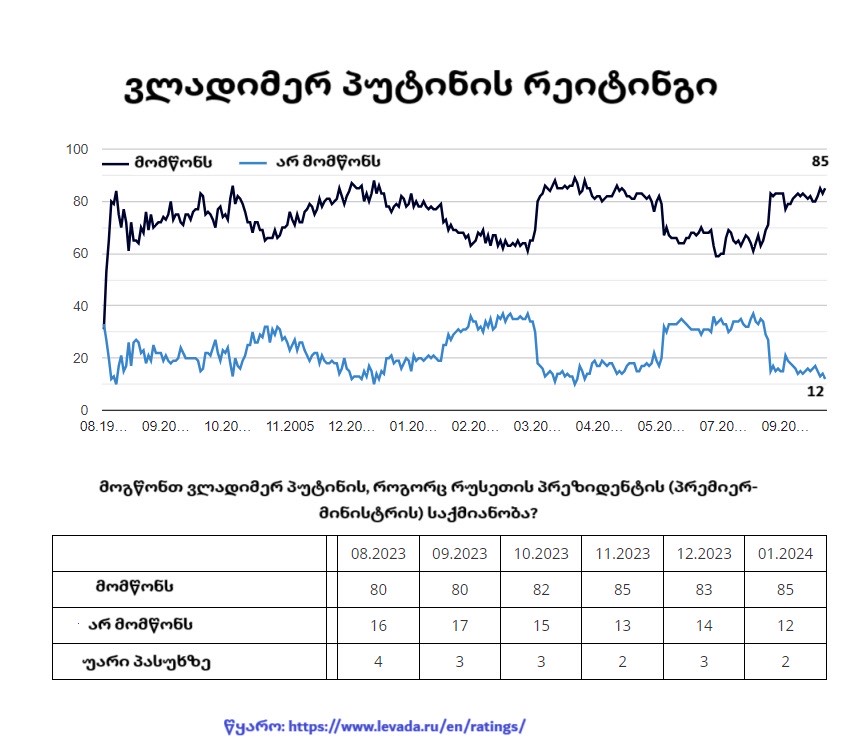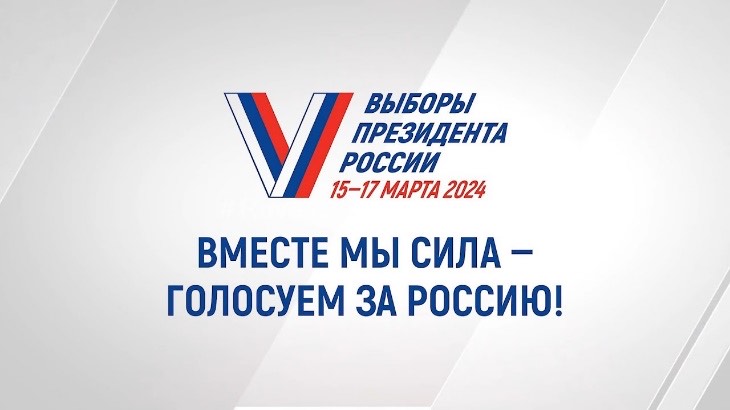Author: Eka Javakhishvili
The forthcoming Russian presidential election is scheduled for March 15–17, 2024. Nobody was surprised by Vladimir Putin’s decision to seek the presidency for a fifth time, following his win in the elections of 2000, 2004, 2012, and 2018. After the constitutional amendments implemented in 2020, the term of office of the Russian president was “nullified,” and, as such, Putin can run for two more six-year terms – in 2024 and 2030. This implies that he will be able to remain in power until 2036. The results of the 2024 presidential elections can be easily predicted – Putin is the unopposed leader among the registered presidential candidates. As a result of the elections, no changes or innovations are expected in the Russian political space, considering that the opposition candidates were not even allowed to participate in the election process.
This year’s March elections differ from the previous, 2018, presidential elections in that Vladimir Putin’s power is even more centralised, and the pressure on the opposition and the media has increased. Although Russian elections are neither free nor fair, they are a necessary tool for Putin to strengthen the legitimacy of his government. Furthermore, this is the first presidential election to be held after Putin’s command to invade Ukraine in February 2022. It should be highlighted that this time around, voting will also be held in the occupied territories of Ukraine, which Russia has illegally seized and refers to as its “new territories.”
The ongoing war with Ukraine presented additional challenges to the current president of Russia, both domestically and internationally. Over the past two years, up to 150,000 Russian troops have been killed, the Russian economy has suffered greatly from the West’s tightening sanctions, and Moscow’s ties with the US and the EU have rapidly worsened. Despite these growing challenges, however, Putin is actively using the issue of Ukraine’s “special military operation” in his pre-election campaign. It is interesting to take a look at how the Kremlin is “packaging” this topic so as to best mobilize voters.
Presidential candidates
On January 29, 2024, Russia’s Central Election Commission (CEC) officially registered Vladimir Putin as an independent presidential candidate for the March 17 election. The other candidates registered by the CEC are the leader of the Liberal Democratic Party of Russia, Leonid Slutsky; the Deputy Speaker of the State Duma from the New People Party, Vladislav Davankov; and member of the Communist Party of the Russian Federation, Nikolai Kharitonov.
The CEC did not register any non-systemic opposition candidates. Boris Nadezhdin, who submitted 100,000 legally required signatures to get on the ballot, had the highest chance among the rejected opposition candidates. However, the CEC claimed to have found defects in 15% of the signatures, and he was thus refused the right to register. In the Russian media, Nadezhdin is accused of having made a deal with Putin, and doubts are often brought to the fore about his real oppositional attitude. Indeed, according to some, Nadezhdin’s election platform, which consisted of calls for an end to the war with Ukraine, was directly coordinated with the Kremlin to emphasise after his defeat that the anti-war stance is not supported by the Russian electorate.
Ratings
Vladimir Putin, as an authoritarian leader, constantly requires his popularity to be expressed in numbers to make his ruling mandate visible to everyone. Considering that Putin’s formal rivals in the 2024 elections do not enjoy either a perfect reputation or much public support, their ratings can be measured on average in the range of 5%-10%, and Putin will most likely get at least 80% of the vote.
to everyone. Considering that Putin’s formal rivals in the 2024 elections do not enjoy either a perfect reputation or much public support, their ratings can be measured on average in the range of 5%-10%, and Putin will most likely get at least 80% of the vote.
Some experts point out that since 2004, there has been no more intrigue in the presidential elections in Russia, and the main challenge for the Kremlin is now not the percentage of votes received by Putin, but the voter turnout.
According to the first election ratings of the Russian pro-government sociological research company VCIOM (ВЦИОМ), published on February 10, Vladimir Putin takes first place, with 75% of the votes, Vladislav Davankov takes second place with 5%, and Nikolai Kharitonov and Leonid Slutsky share 4%-4% of the votes. As for voter activity, 76% of respondents said they intend to go to the polling stations.
The issue of the “special military operations” in Ukraine in Putin’s pre-election campaign
Although many experts expected the presidential elections in Russia to be postponed due to the war with Ukraine, this did not happen, because Putin needed exactly this situation to gain an unconditional victory. We can see that Putin’s past election campaigns were also accompanied by wars and so-called “special operations” – the war in Chechnya, the war with Georgia, the annexation of Crimea, and now the full-scale invasion of Ukraine. The Kremlin has always presented Vladimir Putin as if he is the only leader who can lead his country through great hardship.
The war with Ukraine dictates its own rules to the current president. Putin and his entourage are forced to flexibly manoeuvre in a new reality of their own making. It is symbolic that Putin announced his intention to run in the 2024 presidential election on December 8, 2023, at a ceremony for Heroes of the Fatherland Day. At the meeting, one of the “heroes,” a speaker of the so-called Parliament of the Donetsk People’s Republic, Artyom Dzhoga, asked him on behalf of the military and all the people living in the “new Russian regions” to run for re-election.
Significantly, the Central Election Commission (CEC) chose the Latin letter “V” in the colours of the Russian flag as a logo, alongside the slogan “Together we are strong – vote for Russia!” to promote the March 17 election. The letter “V,” which first appeared on tanks headed towards Ukraine in early 2022, has since been used by Russian officials to signify support for the invasion, while Putin often uses the phrase “Together we are strong” at public events. Although the CEC slogan is not Putin’s directly, it indirectly strengthens his position, and the appsearance of the Latin letter “V“ on the billboards can be considered covert propaganda for the continuation of aggression against Ukraine.
Putin’s election campaign focuses on the “noble” goals of the war with Ukraine, and is aimed at the “patriotic sentiments” of the voters. Putin constantly emphasises that Ukraine’s “special military operation” serves to protect the residents of Donbas and to ensure the security goals of Russia itself against aggression from NATO and Western countries. He blames the “Western elite” and the “Kyiv Nazi regime” for starting the war in Ukraine, with Russia being obliged to protect the Russian nation there. Before the election, Putin made more tough statements about Ukraine, stating he considered the ongoing war a matter of “life and death” for Russia. As he mentioned in one of his interviews, the only thing he can regret is that “Russia did not start active moves in Ukraine earlier.”
On February 29, Vladimir Putin used his annual speech to the Federal Assembly as a platform for his election campaign. He spoke threateningly against Western countries and NATO, and convinced the population of Russia’s military superiority on the battlefield in Ukraine. Putin said Russia has weapons capable of striking targets on the territory of Western countries, and pointed to the growing threat of nuclear weapon use in case of provocations by the West. He noted that Western countries have already forgotten what war is, and claimed that they believe that what is happening in Ukraine is a “cartoon.” According to Putin’s threat, if NATO sends troops to Ukraine, it will have tragic consequences for the West. In his speech, he emphasized again that Russia did not start the war in Ukraine, and that the goals of “demilitarization and denazification” would be fulfilled to the end.
Putin also confidently stated that the military operation in Ukraine was supported by the absolute majority of Russians and that, despite all the trials and losses, the people are firm in this choice.
Conclusion
In the current conditions, Vladimir Putin is all but guaranteed to be re-elected as president for a 5th term. The ending of the war with Ukraine is definitely not included in his short-term plans, as indicated by the intensified pre-election rhetoric about Russia’s military invincibility and the completion of the tasks of the “special operation,” imbued with patriotism. Putin’s victory in the elections means that the electorate will support his pro-war rhetoric, so the election results (which are already virtually determined) will allow Putin to fully legitimize the continuation of the war with Ukraine at home. Obviously, at this stage, it is very important for Putin that the population does not question the prolongation of the war. As experts note, the future of Russia will not be decided at the March presidential elections, but on the Ukrainian frontlines.





